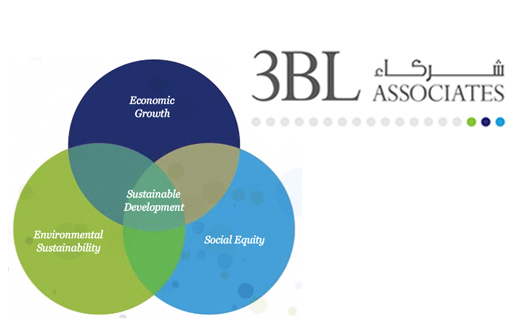Building a Culture of Sustainable Development in Bahrain

 In a deceptively gentle British cadence, Leena
Al Olaimy firmly gets right to the point when it comes to
sustainable development in Bahrain. “Nothing is silo-ed in the real
world. But when organizations don’t talk to each other, you see a
splintering of efforts and resources. As the least resource-endowed
of the Gulf countries, resource optimization is crucial for our
social, economic and environmental sustainability.”
In a deceptively gentle British cadence, Leena
Al Olaimy firmly gets right to the point when it comes to
sustainable development in Bahrain. “Nothing is silo-ed in the real
world. But when organizations don’t talk to each other, you see a
splintering of efforts and resources. As the least resource-endowed
of the Gulf countries, resource optimization is crucial for our
social, economic and environmental sustainability.”
As we drive around Manama on a sunny day, a city that has seen its
share of political turmoil over the past year, Bahrain’s native
entrepreneurial spirit is evident in small shops scattered all over
the city. Starting your own business is hardly a foreign concept
for Bahraini youth, which has had a culture of entrepreneurship
since the days of its pearl divers, some will tell you, but many
youth today simply want to start something small and don’t have the
urge to innovate or scale, says Al Olaimy.
On a broader scale, Al Olaimy sees a similar disconnect, as
organizations work to patch social issues with quick fixes rather
than dealing with root causes. One organization, she recalls, was
raising money to feed local families. “I asked, have you considered
giving them produce to grow instead, to generate ongoing
income?”
Another non-profit hosted a fundraiser for children with Down
syndrome, but didn’t include them in the event. “The organizers
said that it would be too depressing,” she says, squinting at their
choice to feed social stigma. It’s clear that Al Olaimy is unafraid
of politely exploding social stereotype.
Encouraging a long-term vision across the board in her native
environment is exactly what brought her back to Bahrain to co-found
3BL (“Triple Bottom Line”)
Associates, a social impact and sustainability consultancy,
after completing an MA at Dartmouth and studying at Harvard
Business School.
“I was guilty of practicing more 'traditional' forms of
donation-centric CSR [corporate social responsibility] in the early
2000s,” she admits. But after discovering social enterprise at
Dartmouth and studying microfinance guru Muhammad Yunus, she never
looked back.
“The challenge is getting the private sector to see sustainability
as an opportunity that can generate revenue while mitigating risk,
rather than a nonstrategic marketing tool,” she explains.
When she and her brother Tariq, who studied at the Cass Business
School and worked for a local social enterprise in London, returned
to Bahrain in 2009, “there wasn’t an outlet for the kind of work we
wanted to do—which some of our clients now affectionately refer to
as professional idealism” she recalls. NGOs were “too traditional”
in their approach, and government and international bodies were
riddled with bureaucracy – “we had no choice but to create a hybrid
organization.”
Expanding a Holistic Vision
Today, 3BL is forging a new path for businesses in
Bahrain, helping them to have more social impact through
multistakeholder development. “If we are working on a CSR issue for
a company, on, say, affordable housing, we would hope to leverage
the Ministry of Housing, local municipalities, enterprise support
organizations like Tamkeen, and
local NGOs,” says Al Olaimy. It may sound simple, but all too often
the biggest issue, she explains, is simply that different relevant
departments within NGOs, governments, international organizations,
and the private sector, simply don’t coordinate and
collaborate.
To secure steady work, Al Olaimy and her brother have had to slowly
educate the market. In the beginning, it was tough, she admits. “I
had to ask myself, am I going to be able to have a salary next
month?” She survived by living with her family and adopting a very
lean lifestyle- “at least petrol is cheap,” she says, quickly
adding that she doesn’t support the heavy petroleum industry
subsidies that detract from renewable energy R&D in the
region.
Yet as they demonstrate the financial benefits of their approach,
along with the social and environmental upside, work is steadily
increasing. They are also working on advocacy on the side. “We’re
still learning as we go,” says Al Olaimy. “We don’t really have
anyone to model ourselves after or benchmark ourselves by. A lot of
our efforts are also to raise awareness of what we do and why it’s
important.”
One benchmark Al Olaimy does look to, however, is her grandfather,
who started an ad agency in the 70s. “At that time in Bahrain,
people looked at advertising as a company need, but didn’t
understand the need for PR. Today, most companies have a PR agency.
I try to remind myself of that. But hopefully it won’t take 40
years,” she says brightly.
In fact, earlier this year, she recalls, at the Skoll World Forum
on Social Entrepreneurship at Oxford University (where 3BL was the
first Bahraini organization to be invited), "someone said 'To be a
social entrepreneur, you have to be misunderstood for 10
years.'"

